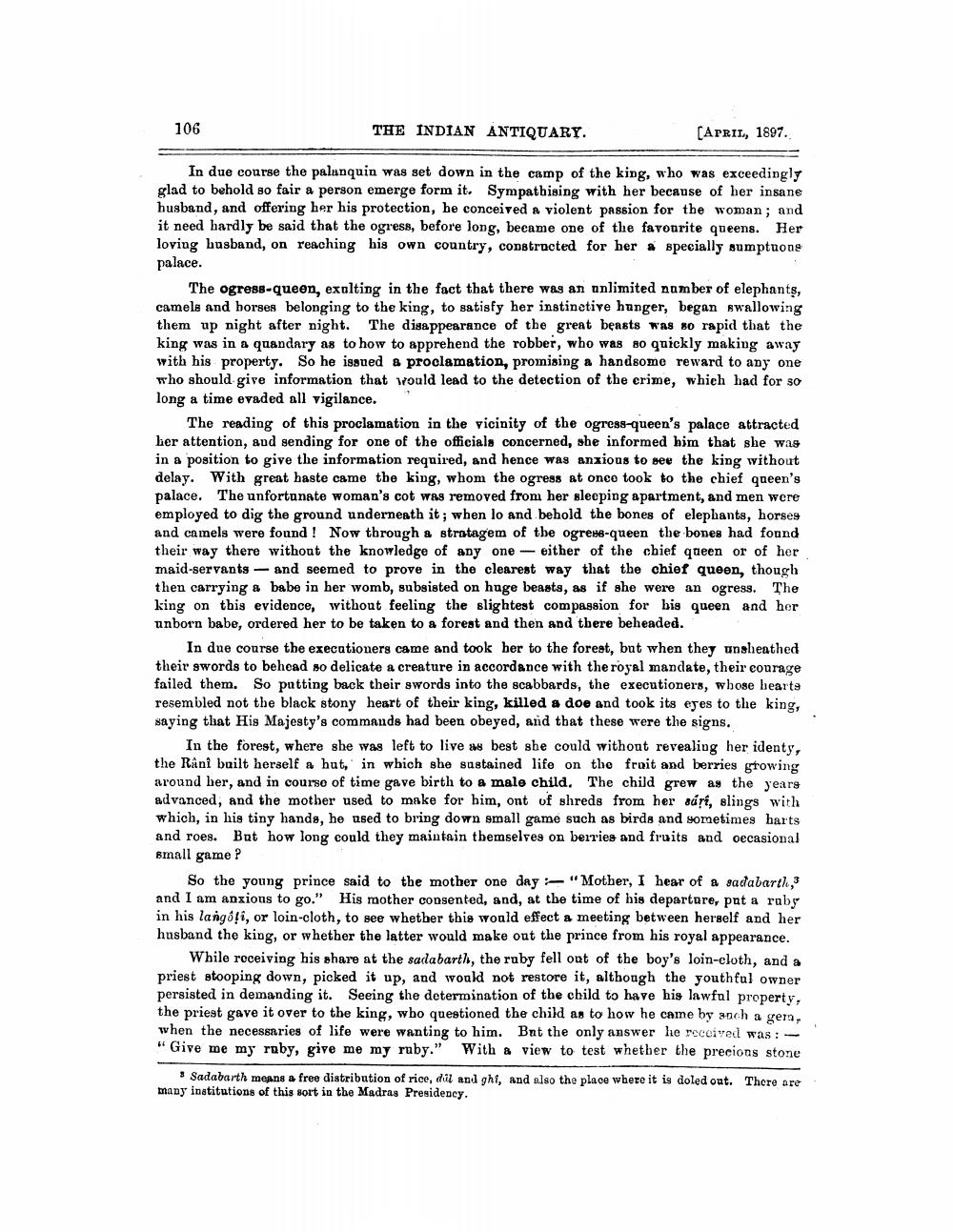________________
106
THE INDIAN ANTIQUARY.
(APRIL, 1897. -
In due course the palanquin was set down in the camp of the king, who was exceedingly glad to behold so fair a person emerge form it. Sympathising with her because of her insane husband, and offering her his protection, he conceived a violent passion for the woman; and it need hardly be said that the ogress, before long, became one of the favourite queens. Her loving husband, on reaching his own country, constructed for her a specially sumptuone palace.
The ogress-queen, exolting in the fact that there was an unlimited number of elephants, camels and horses belonging to the king, to satisfy her instinctive hunger, began swallowing them up night after night. The disappearance of the great beasts was so rapid that the king was in a quandary as to how to apprehend the robber, who was so quickly making away with his property. So he issued & proclamation, promising a handsome reward to any one who should give information that would lead to the detection of the crime, which had for so long a time evaded all vigilance.
The reading of this proclamation in the vicinity of the Ogress-queen's palace attracted her attention, and sending for one of the officials concerned, she informed him that she was in a position to give the information required, and hence was anxious to see the king without delay. With great haste came the king, whom the ogress at once took to the chief queen's palace. The unfortunate woman's cot was removed from her sleeping apartment, and men were employed to dig the ground underneath it; when lo and behold the bones of elephants, horses and camels were found ! Now through a stratagem of the ogress-queen the bones had found their way there without the knowledge of any one - either of the chief queen or of her maid-servants - and seemed to prove in the clearest way that the chief queen, though then carrying a babe in her womb, subsisted on huge beasts, as if she were an ogress. The king on this evidence, without feeling the slightest compassion for his queen and her unborn babe, ordered her to be taken to a forest and then and there beheaded.
In due course the executioners came and took her to the forest, but when they unsheathed their swords to behead so delicate a creature in accordance with the royal mandate, their courage failed them. So patting back their swords into the scabbards, the executioners, whose hearts resembled not the black stony heart of their king, killed a doe and took its eyes to the king, saying that His Majesty's commands had been obeyed, and that these were the signs.
In the forest, where she was left to live as best she could withont revealing her identy, the Rânî built herself a hut, in which she sustained life on the froit and berries growing around her, and in course of time gave birth to a male child. The child grew as the years advanced, and the mother used to make for him, ont of shreds from her sárt, slings with which, in his tiny hands, he used to bring down small game such as birds and sometimes harts and roes. Bat how long could they maintain themselves on berries and fruits and oecasional small game ?
So the young prince said to the mother one day - "Mother, I hear of a sadabart1,3 and I am anxious to go." His mother consented, and, at the time of his departare, pat a raby in his langoli, or loin-cloth, to see whether this would effect a meeting between herself and her husband the king, or whether the latter would make out the prince from his royal appearance.
While receiving his share at the sadabarth, the ruby fell ont of the boy's loin-cloth, and a priest stooping down, picked it up, and would not restore it, although the youthful owner persisted in demanding it. Seeing the determination of the child to have his lawful property, the priest gave it over to the king, who questioned the child as to how he came by anch a gen, when the necessaries of life were wanting to him. But the only answer he received was: - "Give me my ruby, give me my ruby." With a view to test whether the precions stone
Sadabarth means a free distribution of rice, dil and ghi, and also the place where it is doled out. There are many institutions of this sort in the Madras Presidency.




